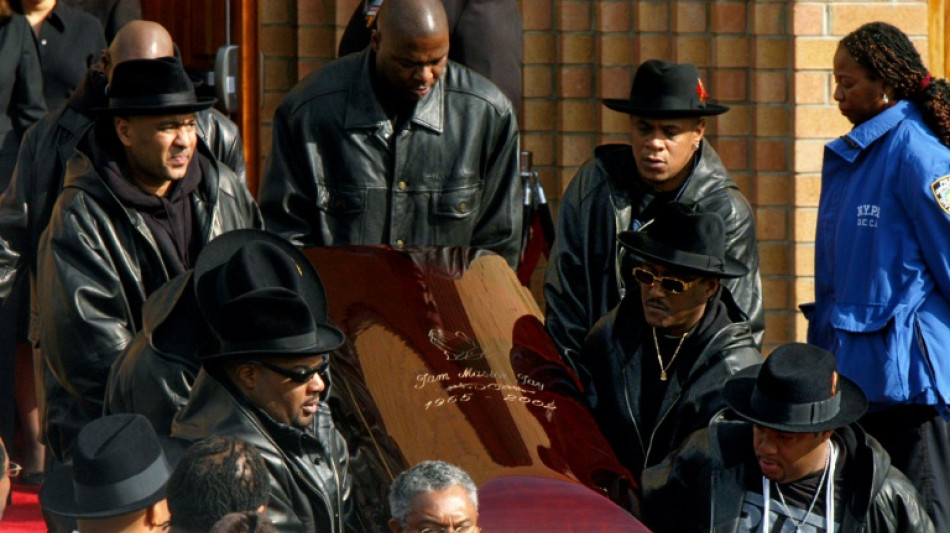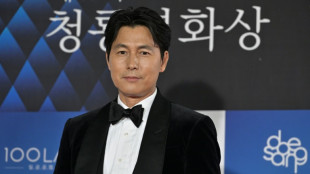

Long-awaited trial over Jam Master Jay murder nears verdict
The alleged murderers of Jam Master Jay were executioners who ambushed the Run-DMC member as part of a drug dispute, US prosecutors told jurors Tuesday during closing arguments of the long-awaited trial.
The proceedings, to be decided by an anonymous jury in Brooklyn federal court, are centered on the events of October 30, 2002, when pioneering rapper Jason "Jay" Mizell, widely known by his DJ moniker, was fatally shot in the head in his Queens studio.
He was 37 years old and a father of three.
The murder was a cold case until prosecutors in 2020 announced a 10-count indictment against suspects Ronald Washington and Karl Jordan Jr., the alleged shooter.
"This case is not complicated," said assistant US attorney Artie McConnell in delivering the government's final arguments, which followed some three weeks of witness testimony, including from alleged eyewitnesses, friends and law enforcement.
"It's about greed, it's about money, it's about jealousy," the prosecutor said before spending approximately two hours reiterating the timeline of events and web of alleged actors and witnesses for the jury.
The prosecution alleges that as part of a drug deal dispute, Jordan -- the slain musician's godson -- shot a 40-caliber bullet into Mizell's head, as Washington held others in the room back at gunpoint.
For years two key witnesses -- Lydia High and Uriel "Tony" Rincon, the latter of whom was shot in the leg the night of the murder -- had resisted cooperating with law enforcement, reticence both they and prosecutors ascribed to fear.
But more than two decades on, both of them were among the several dozen government witnesses to testify against Jordan and Washington, who prosecutor McConnell said committed murder he described as "brazen" for "the brutality of it, the arrogance of it, the audacity of it."
The defense has sought to cast doubt on the memories of witnesses speaking out some 20 years later.
But McConnell said that "20 years hasn't made this any less real or any less wrong."
The prosecutor said Mizell had "God-given talent" but was also "a good man, he was a generous man, he was a kind man" who was killed by members of his own circle, in his own studio in Queens.
"20 years is a long time to wait for justice," McConnell said. "20 years is long enough."
- Financial lifeline -
The trial has revealed a lesser-known side of Mizell, who along with his band Run-DMC had railed against drug culture.
But prosecutors say Mizell got involved in the drug trade to support his lifestyle and those close to him, as buzz around the group's music -- hits include "It's Tricky" and "Walk This Way" -- began to fade.
He was a quiet middle man in the drug trade, and a financial fount for family and friends, in the years preceding his death, they say.
Jordan and Washington hatched their plan, according to prosecutors, after Mizell cut them out of a job.
Along with LL Cool J and Public Enemy, Run-DMC were trailblazers of new-school hip hop -- mixing rock elements, aggressive boasting and sociopolitical commentary -- and its outgrowth, golden era hip hop, which included eclectic sampling.
The seminal group were the first rappers featured on MTV, and established a new rap aesthetic incorporating street culture, a departure from the flashy, disco-inflected attire of their predecessors.
Prior to his death, Mizell was influential in New York as a cultivator of local talent, working with young rappers and co-founding a DJ academy.
Jam Master Jay's slaying followed a spate of murders within the rap community in the 1990s, including the shootings of superstars Tupac Shakur and The Notorious B.I.G.
Jordan and Washington face charges of murder while engaged in narcotics trafficking, and firearms-related murder.
Their defense teams will deliver closing arguments on Wednesday.
A third defendant, Jay Bryant, is accused of letting Mizell's murderers into the building. He will be tried separately at a later date.
彭-C.Péng--THT-士蔑報




